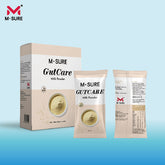Mental Health and Diet-Related Research in Australia
by
BiotechAusway
24 Sep 2025
1. Dietary Interventions for Depression
-
A 10-year Australian study found women following a traditional diet (vegetables, fruits, whole grains, lean meats) had a 30% lower risk of depression.
-
Women consuming a Western diet (processed foods, high sugar) had a 50% higher risk of depression.
-
In 2024, the world’s first clinical trial confirmed that diet interventions guided by nutritionists were as effective as psychotherapy for mild depression.
2. Mediterranean Diet and Mood Improvement
-
University of South Australia research showed adults >60 following a Mediterranean diet (olive oil, fish, nuts) had reduced anxiety and stress.
-
Findings published in Nutrients suggest effects are mediated via gut microbiome regulation and neurotransmitter synthesis.
3. Key Nutrients and Mental Health
-
B Vitamins: from whole grains and legumes; support neurotransmitter production.
-
Omega-3 Fatty Acids: fish consumption linked to lower depression risk.
-
Dietary Fiber: regulates mood via the gut–brain axis.
-
Antioxidants: dark fruits and vegetables reduce oxidative brain damage.
4. Dietary Recommendations for Specific Groups
-
Women: University of Melbourne study recommends reducing processed foods and increasing low-fat dairy and minimally processed foods (ages 20–93).
-
Older Adults: Mediterranean diet may slow cognitive decline and lower dementia risk.
-
Metabolic Disorders: emphasize blood sugar control; recommend low-GI foods.
5. Policy and Public Health Impact
-
Australia has integrated dietary interventions into depression treatment plans.
-
Dietitians are officially recognized as part of mental health services.
-
The 2025 updated dietary guidelines emphasize women’s nutrition across the lifespan.
6. Future Research Directions
-
Investigating molecular mechanisms linking gut microbiota and mental disorders.
-
Assessing effectiveness of dietary interventions across different cultural backgrounds.
-
Clinical validation of digital nutrition intervention tools.






